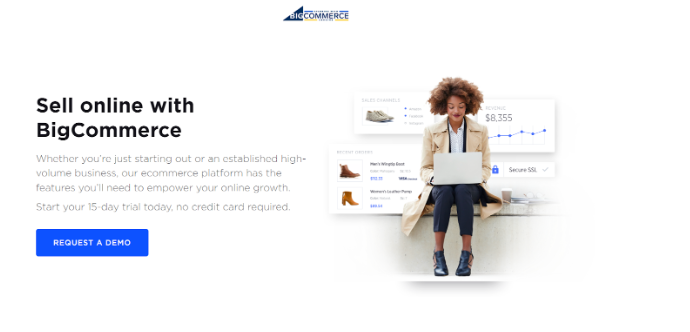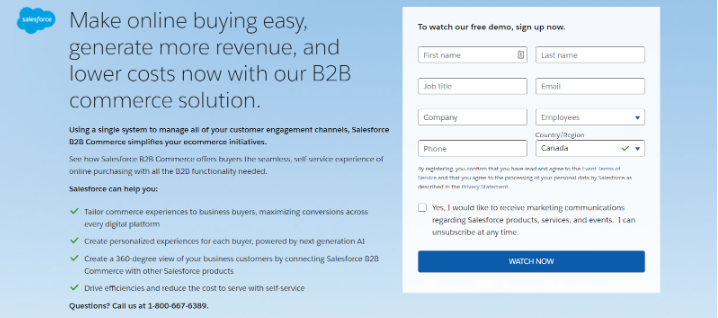Whether you're a furniture wholesaler, a lighting manufacturer, or a B2B brand selling conference swag, B2B eCommerce businesses face distinct challenges that many traditional B2C platforms simply can't address. The complexity of B2B transactions—ranging from intricate payment processing workflows to custom account portals with varying access controls and ERP system integrations—requires a platform tailored specifically to these needs.
Choosing the right B2B eCommerce solution isn't just about setting up a storefront. It’s about optimizing every part of the purchasing process, from order management to customer service, ensuring that transactions are smooth, secure, and efficient. With the rise of remote work and digitalization, businesses need eCommerce platforms that integrate seamlessly with their existing systems, handle complex pricing structures, and manage bulk orders with ease.
In this post, we’ll take a deep dive into the essential features of the top B2B eCommerce platforms. By understanding what works best for your business, you’ll be able to make an informed decision and improve the efficiency and scalability of your operations. Additionally, as the B2B landscape continues to evolve, choosing a platform that offers scalability and adaptability is key to staying competitive in an increasingly digital marketplace.
What is a B2B eCommerce platform?
A B2B eCommerce platform enables wholesalers, manufacturers, resellers, distributors, and B2B eCommerce companies to sell through an online storefront. Traditionally, B2B eCommerce was conducted offline or through very manual, labor-intensive online methods. However, that’s slowly been changing over the past couple of decades and further accelerated due to the first and second-order effects of the COVID-19 pandemic.
Why most B2C payment platform functionality won’t work for wholesalers and manufacturers
One of the biggest challenges that B2B eCommerce businesses face is that they have different challenges that are often not addressed by traditional B2C eCommerce platforms.
While B2C platforms emphasize value propositions designed for small businesses like an all-in-one SaaS solution, an easy way to upload your entire product catalog, and key features to optimize your eCommerce website to drive more self-service sales. Another telltale sign is they all tend to have large app stores full of add-ons. So, you can easily sync your eCommerce platform with your CRM, inventory management, and order management software.
However, B2B businesses require specific B2B features to account for different business needs. For starters, most B2B buyers go through a different buying experience due in large part to the fact that average order values are much larger, sales transactions are made under net terms, B2B payments are deferred, and these brands have to carefully manage working capital. This requires more rigorous B2B payment processes.
For instance, if you are a manufacturer, your sales and accompanying payments are likely going to be significantly larger and carry more risk of a customer defaulting on their net terms agreement. This means the manufacturer must do their due diligence and institute thorough business credit checks and review processes on all corporate accounts each time. Traditional B2C platforms often can’t accommodate the level of due diligence required to do this.

4 essential features for B2B eCommerce platforms
Here are the four most vital features to look for in B2B eCommerce platforms:
1. Ease of use
The most important thing for your customer is the experience when they visit or purchase through your website. Ensuring the experience is simple and easy for your buyer is crucial. Simple and intuitive user experience is an essential best practice regardless of whether you are selling B2B or B2C.
2. Access controls and permissions
When you are only selling direct-to-consumers, having one primary website that everyone can access works fine. However, if you also sell wholesale or are a manufacturer, you’ll likely need two websites if you are using a traditional B2C platform. This not only introduces more work since you have to update two websites, but also introduces room for more human error.
That’s why an essential B2B eCommerce platform must have appropriate settings to create different customer groups, modify user permissions, and access controls. At the bare minimum, this ensures that you can display specific pricing for wholesale customers and another set of prices for consumers.
However, most B2B eCommerce businesses need to take segmentation a step further and assign different roles and permissions based on things like the purchaser’s location, and purchasing history.
3. Integration with your customer management, inventory, and order fulfillment systems
An online eCommerce platform is just one of many systems that a B2B business is using. Integration of this platform with other tools allows critical functions such as real-time inventory updates, warehouse management, order fulfillment, and pricing updates to be fully or partially automated.
4. Purchase order financing and customization
As we alluded to above, B2B businesses have different payment processing requirements in order to do their business credit checks, risk management, and due diligence. Having a platform that can be customized to standardize the credit and risk management, and due diligence process is essential for both maximizing employee efficiency and minimizing unnecessary risk. Some solutions, such as Resolve, offer net terms for B2B eCommerce, making the entire credit, risk, and net terms management much easier for B2B businesses.
The 6 top B2B platforms: comparing functionality
Let’s look at the features and pricing of some popular B2B platforms.
1. Adobe Commerce
Formerly Magento Commerce, this eCommerce platform made waves in the B2B market because of its scalability and customizability. One essential feature that makes Adobe Commerce a good choice for B2B companies is its comprehensive internationalization features. The platform supports multiple currencies, languages, and tax rates. This makes it useful for even those merchants with a high sales volume.
Some popular brands using Adobe Commerce are Rural King, JCB, Bulk Powders, and DocShop Pro.
Pricing starts at around $22,000 per year for a full Enterprise site.
2. WooCommerce
WooCommerce is the market leader for eCommerce platforms, and it is an excellent option if you want an open-source solution or your business loves WordPress. Since it is powered by WordPress, the platform is extremely nimble and flexible when it comes to modifying the source code, themes/templates, plugins, and hosting. It is also a solid option for SEO purposes, if you are looking to optimize your online store for more organic search traffic.
This comes with a downside. If you don’t have experienced WordPress developers on staff, you may find it difficult to mold the platform to your needs. This is particularly true since the default functionality is designed for newbie B2C sellers looking for a basic ecommerce site to list their product SKUs.
Brands using the platform are Porter and York, Barefoot Buttons, and Underwear Expert.
3. BigCommerce
Seen as a more open and flexible alternative to Shopify, BigCommerce is seen as a solid alternative for many enterprise and mid-market brands. With key features such as highly flexible APIs and the ability to freely customize the platform, customization, this makes it a great option for both B2B and B2C customers. For instance, the platform allows you to adjust display text, app elements, and checkout configurations.
BigCommerce also supports an extensive network of payment providers.
While BigCommerce is gaining ground with B2B brands, this platform is still better suited for B2C sellers as many start to run into limitations if they are selling both B2B and B2C.
Some brands using BigCommerce platforms are Skullcandy, bliss, and Burrow.
4. Shopify Plus
Shopify Plus, the enterprise arm of Shopify, is one of the most popular selling platforms on the market. It offers state-of-the-art service for providing an exceptional user experience.
The platform comes with access to wholesale eCommerce and can be added to your website with just a few clicks. The extensible feature of the platform allows you to tap into any element, from order tracking to payment options.
However, as a hosted platform, it doesn’t cater to the extent of customization a B2B company may need. It is thus a better option for B2C companies than B2B ones.
Leading brands such as Motorola, Adidas, and Tesla rely on this platform for their B2B selling.
Pricing starts at $2000 per month.
5. Salesforce Commerce Cloud
Salesforce Commerce Cloud is a solid alternative if your entire business is fully in the Salesforce ecosystem and you have a large team of Salesforce developers and administrators on standby.
The platform's key feature is multi-tenancy, which refers to an architecture where a single instance of the software serves many customers and runs on a server. It also allows all tenants to share one software application. This feature makes the platform a great choice for merchants making bulk order purchases.
But it is a terrible option for pretty much anyone else, as it is expensive as compared to the other platforms. In addition, its user interface and feature set are cumbersome and basic, especially for the price.
6. Netsuite SuiteCommerce
Netsuite SuiteCommerce is an excellent pick for brick and mortar retail establishments as well as B2B brands that are already using NetSuite ERP.
The platform supports multiple locations and allows you to engage with users on multiple channels. It’s scalable, modern, and has a good quality UX. The software also allows you to automate crucial operations and boost your site's visibility. SuiteCommerce is one of the most deployed ERP management tools and is available across 140 countries.
Popular brands using the platform include DIYHomeCenter, PhilzCoffee, and Lovesac.
It is currently being used in over 140 countries, and the base license costs around $999 per month. However, most brands should expect to pay at least $100,000 for migration and customization.
A better B2B eCommerce payment platform alternative.
Many of the B2B eCommerce software platforms we’ve listed above are designed for B2C business models. While they can be adapted to the needs of B2B buyers, the customizations often resemble Bandaid fixes.
When in reality, the biggest challenge facing many of these brands is tied to the B2B sales process, which impacts everything from payments and the customer experience for B2B customers to cash flow management and risk mitigation. That’s where embedded software solutions like Resolve come in. Embedded B2B payment solutions like Resolve make it easier for businesses to offer net terms through their online sales channels, making the entire net-30 workflow transaction seamless, simple, and fluid.
How the right B2B payment checkout can help businesses increase sales
As an example, DocShop Pro is an industry-leading B2B medical marketplace servicing clinics and medical clinics all over the country. As a technology-first company that uses Magento as their eCommece platform, they also use Resolve to power all their net terms and B2B payments which have ultimately helped the company increase cart sizes.
Some key Resolve features that help the team at DocShop Pro provide seamless buying experiences:
- Bulk credit checking, credit decisioning and approvals for a customer’ terms and credit line
- A gray-label platform so customers continue to interact with a branded DocShop Pro buying experience
- End-to-end net terms management
- Key integrations with accounting ERPs
Looking for a way to elevate your B2B eCommerce experience? Ready to streamline B2B payments and provide better net terms just like DocShop Pro? Request a free demo here.











